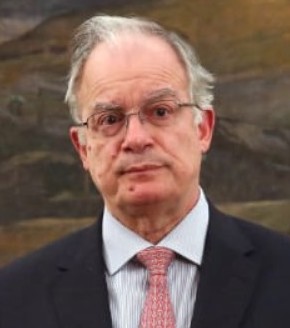Top Qs
Timeline
Chat
Perspective
2025 Greek presidential election
From Wikipedia, the free encyclopedia
Remove ads
Indirect presidential elections were held in Greece beginning on 25 January 2025 for the president of the Hellenic Republic.[1] A second round was held on 31 January 2025 after no candidate won a majority in the Hellenic Parliament, with the same result as in the first. A third round of voting was held on 6 February 2025, where no candidate reached the reduced required majority of 180. The fourth round was held on 12 February 2025, where Konstantinos Tasoulas was elected as President of Greece.
Remove ads
Constitutional provisions
According to Article 32 of the Constitution of Greece, the president is elected for a five-year term by the Hellenic Parliament in a special session at least a month before the incumbent's term expires. The first and second rounds require a supermajority of 200 out of the 300-strong body, dropping to 180 on the third.[2]
As of November 2019, after a constitutional amendment, Article 32, Paragraph 4 of the Greek Constitution which states about the election of the President was changed and the new reform of the paragraph is as follows: If after 3 ballots, the president is not elected, the 4th ballot's threshold will drop to 151 votes, and the 5th and last ballot would decided by a relative majority.[2]
Remove ads
Candidates
Summarize
Perspective
Christos Rammos
On 4 December 2024, the New Left party proposed that the various left-wing parties rally behind the candidacy of the chairman of the Communications Privacy Authority (ADAE), Christos Rammos.[3] The Communist Party of Greece nevertheless refused to support this proposal, recalling its opposition to the existence of the presidential institution.[4] He himself refused the nomination.[5]
Katerina Sakellaropoulou
In accordance with the provisions of the Constitution, the outgoing President Katerina Sakellaropoulou is eligible for a second five-year term. She has nontheless been the subject of much criticism, notably both for her alleged inaction on the violations of the rule of law for which the conservative government has been criticized,[6] and her progressive stances on issues like LGBT and refugee rights,[7] by opposite sides of the political aisle. Moreover, during her five-year term, the presidential office suffered an unprecedented loss of popularity.[8][9][10]
Konstantinos Kyriakou
On 13 January 2025, in an interview on a radio station, the chairman of the party Niki, Dimitris Natsios, announced his proposal to nominate as a candidate Konstantinos Kyriakou, a Greek minority member of Albania and a member of the party, who was imprisoned during the days of Albania's socialist regime in the 1970s.[11][12]
Konstantinos Tasoulas
On 15 January 2025, Prime Minister Kyriakos Mitsotakis, in a televised message, announced his intention to nominate the Speaker of the Parliament, Konstantinos Tasoulas, as a presidential candidate.[13]
Louka Katseli
On 13 January 2025, the economist, university professor and former PASOK minister, Louka Katseli, was proposed as a candidate by the president of SYRIZA-P.S., Sokratis Famellos, as "a personality who can unite Greek women and Greek men as a common candidacy of the progressive parties of our country".[14]
Tassos Giannitsis
Former multiple PASOK minister, academic and business executive Tassos Giannitsis was proposed by the PASOK–KINAL alliance.[15]
Nikos Konstantopoulos
Zoe Konstantopoulou, president of the Course of Freedom party, proposed as a candidate, her father, Nikos Konstantopoulos, former Synaspismos and SYRIZA president from 1993 to 2004, without informing him beforehand.[16]
Other potential candidates
Against this backdrop, many within the ND party called for another candidate to be put forward by the Prime Minister for this presidential election, with some party deputies going so far as to call for the appointment of a political figure chosen from the right. In this case, the names of former prime ministers Kostas Karamanlis, Panagiotis Pikrammenos, and Antonis Samaras, as well as parliamentary speaker Konstantinos Tasoulas, were mentioned.[17]
The possibility of a candidacy by the Minister of Culture, Lina Mendoni, is also being put forward within the ranks of the parliamentary majority.[18]
Remove ads
Results
Summarize
Perspective
Parliament failed to elect a president in the first round of voting held on 25 January. Konstantinos Tasoulas received 160 votes (200 needed), Louka Katseli 40, Tassos Giannitsis 34, and Konstantinos Kyriakou 14. Since no candidate won a majority in parliament, another round of voting was held on 31 January.[19] In the second round, the members voted in the same division as the first round, with 52 other members abstaining from the vote. The third round, which saw the required majority lowered to 180, was held on 6 February, which again saw little change in the voting totals.[20] A final round took place on 12 February. In this round, the required majority was reduced to 151 votes. Konstantinos Tasoulas got 160 votes, thus winning the election and becoming president-elect.[21]
References
Wikiwand - on
Seamless Wikipedia browsing. On steroids.
Remove ads



